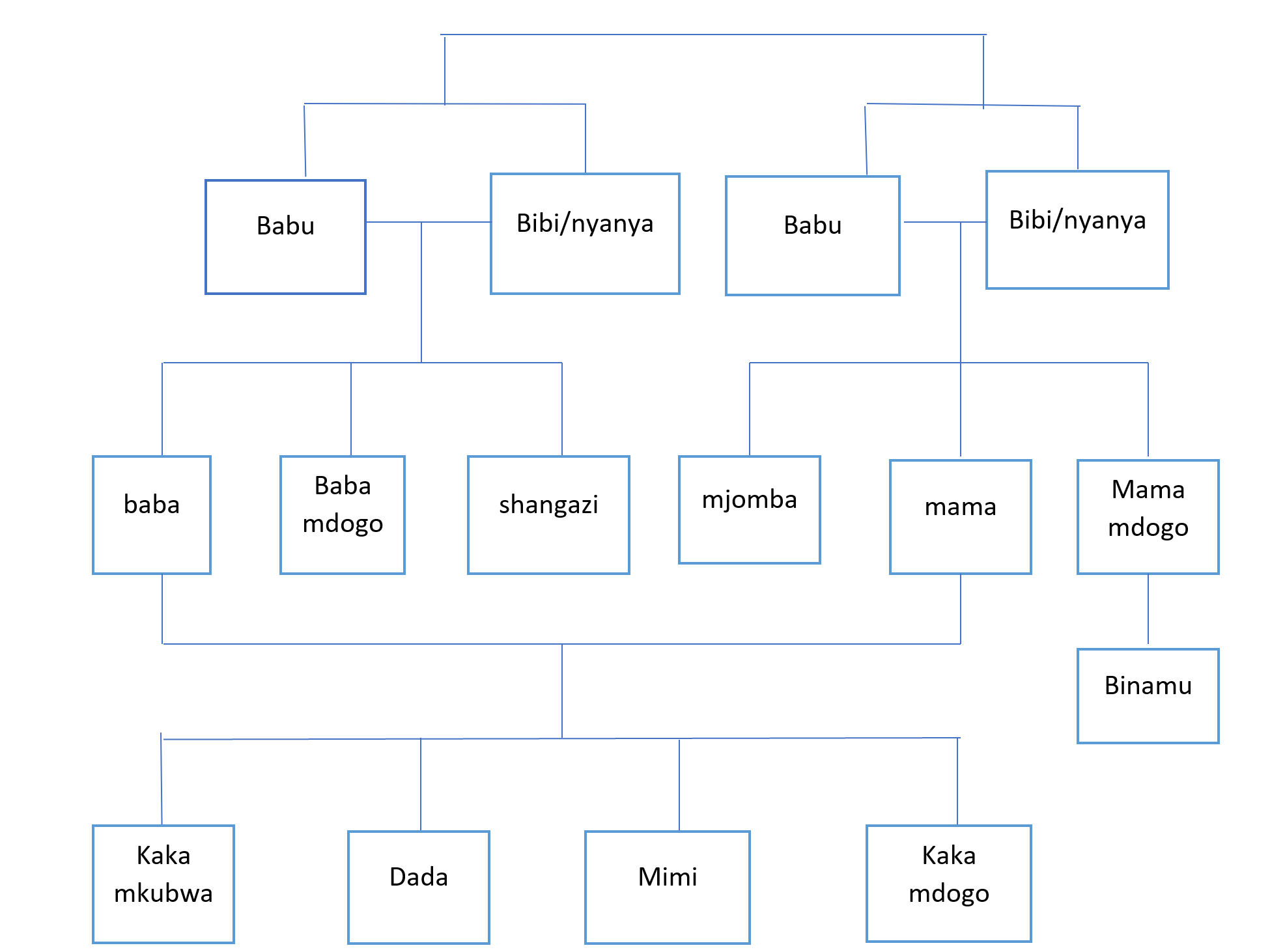Mti wa Familia/Family Tree #

Mazungumzo I: Kusema kuhusu Familia #
Mimi nina familia kubwa.
-
Huyu ni babu yangu, baba wa baba, yeye anaitwa Juma. Yeye anatoka Kenya na anaishi katika mji wa Naivasha Kenya. Yeye anapenda kutembea na kulima, lakini hapendi kusafiri.
-
Huyu ni bibi yangu, mama wa baba, yeye anaitwa Tatu. Yeye anatoka Kenya na anaishi katika mji wa Naivasha pia. Yeye anapenda kupika na kufuma, lakini hapendi kulima.
-
Huyu ni babu, baba wa mama, yeye anaitwa Yohana lakini aliaga. Yeye alitoka Kenya katika mji wa Kisumu. Alipenda kusoma gazeti sana.
-
Huyu ni bibi, mama wa mama, yeye anaitwa Achieng’. Yeye anatoka Kenya na anaishi katika mji wa Nairobi. Yeye anapenda kufuma na kwenda kanisani, lakini hapendi kuishi mashambani.
-
Huyu ni baba yangu. Yeye anaitwa Mbogo. Babangu anatoka Kenya na anaishi katika mji wa Nakuru. Yeye anapenda soka sana lakini hapendi kuogelea.
-
Huyu ni mamangu. Yeye anaitwa Zawadi. Mamangu anatoka Kenya na anaishi katika mji wa Nakuru pia. Yeye anapenda kupika na kununua, lakini hapendi kulima.
-
Kakangu mkubwa anaitwa Juma, kama babu yangu. Yeye anasoma katika Chuo Kikuu cha Nairobi. Yeye anapenda kusoma na kusafiri, lakini hapendi kuogelea.
-
Dadangu anaitwa Tatu, kama bibi yangu. Yeye anasoma katika Chuo Kikuu cha Dar es Salaam, Tanzania. Yeye anapenda muziki na sanaa, lakini hapendi kupika.
-
Kakangu mdogo anaitwa Mambo. Yeye anasoma katika shule ya sekondari katika mji wa Nakuru. Kwa hiyo, anaishi pamoja na wazazi wangu. Yeye anapenda kucheza soka na kukimbia, lakini hapendi kununua.
-
Mimi ninaitwa Yohana, kama babu yangu. Ninatoka katika mji wa Nakuru, Kenya, lakini sasa ninaishi katika Mji wa Evanston, IL. Ninapenda kutazama filamu na kuendesha baiskeli, lakini sipendi kuogelea.
Zoezi I: Familia Yangu
i. Draw a family tree of your immediate family.
ii. Follow the examples given above to talk about members of your family.
Possessives in Swahili #
Here, we shall learn how to use the possessives in Swahili based on the Swahili personal pronouns as follows
| Person | Singular | Plural |
|---|---|---|
| 1st | -angu | -etu |
| 2nd | -ako | -enu |
| 3rd | -ake | -ao |
Mifano/Examples #
-
Mama yangu anapenda kupika.
-
Mama yetu anapenda kupika pia.
-
Dada yako anaitwa nani?
-
Kaka yenu anaitwa nani?
-
Rafiki yake anatoka wapi?
-
Rafiki zao wanatoka wapi?
Zoezi II: Possessives
In pairs, use examples of Swahili possessives to talk about members of your families.
Swahili Adjectives #
All Swahili nouns are categorized into specific groups called noun classes. Each noun class has both the singular and plural form. The noun class for animate beings belongs to the M/WA noun class(es). M indicates singular while WA indicates the plural form. These markers are used to mark the adjectives also. The verbs in M/WA take the subject marker (noun class marker) a- in singular and wa- in plural. Look at the examples below.
Zoezi III: Adjectives
Follow the examples shown in the table below to fill in the blanks of possissives, adjectives , and verbs by attaching the appropriate markers.
| Noun Class | Noun Class Marker | Noun | Possessive | Adjective | Verb |
|---|---|---|---|---|---|
| M | a- | babu | yangu | mzee | analala |
| WA | wa- | babu | zetu | wazee | wanalala |
| M | a- | bibi | Yako | mcheshi | anafuma |
| WA | wa- | bibi | Zenu | wacheshi | wanafuma |
| M | a- | baba | Yake | ___refu | _________cheza (play) |
| WA | wa- | baba | Zao | ____refu | _________cheza |
| M | a- | mama | Yangu | ___zuri | _______pika (cook) |
| WA | wa- | mama | Zetu | ____zuri | ______pika |
| M | a- | dada | ____ako | ____rembo | ________soma(read) |
| WA | wa- | dada | ____enu | ____rembo | ________soma) |
| M | a- | kaka | _____ake | ____dogo | ________kimbia (run) |
| WA | wa- | kaka | _____ao | _____dogo | ________kimbia |
| M | a- | mbwa | Wangu | _____pole | _______kula |
| WA | wa- | mbwa | Wangu | _____pole | ______kula |
| M | a- | paka | Wako | _____tundu | ______kunywa maziwa |
| WA | wa- | paka | Wenu | _____tundu | ________kunya maziwa |
Note: We have only used examples of family names and pets. Also, we have only used adjectives that are originally Swahili that take the adjective markers M in singular and WA in plural. In the subsequent chapters, we shall use diverse nouns and adjectives but basically, this is how the noun classes work. See the following examples of sentences using possessives and adjectives.
Zoezi IV: Adjectives
Follow the examples given below to describe your family members, friend, and pets.
i. Mama yangu ni mrefu kidogo, mrembo, na mcheshi sana.
ii. Baba yangu ni mrefu, mwembamba na mpole.
iii. Babu
iv. Bibi
v. Dada
vi. Kaka
vii. Mimi
viii. Rafiki
ix. Mbwa
x. Paka